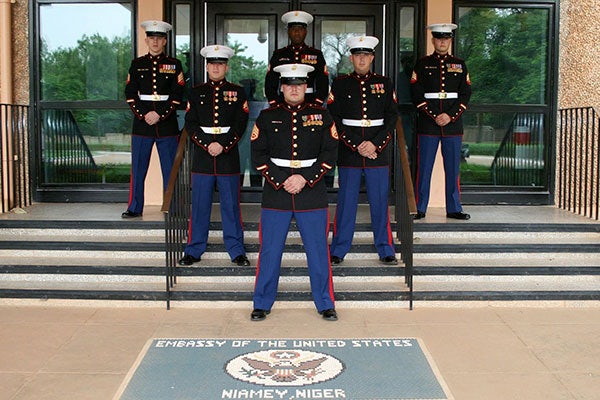Military service provides strong foundation for Sever instructor
Eric Kruse, an alumnus and adjunct instructor at the Sever Institute, found his service as a Marine prepared him well as a cybersecurity expert

After spending six years with the U.S. Marines, Eric Kruse felt more than prepared for his next line of work.
As a Marine, he’d already had an extensive background in physical and operational security. During his service, Kruse was assigned to guard the U.S. Embassy in Niamey, Niger, and the U.S. Consulate at Chengdu, China, protecting the staff and, more importantly, the information kept on the site.
"The primary job of a Marine on embassy duty is to protect the U.S. citizens and property, and prevent the compromise of classified information at their assigned post,” Kruse said. “How do we protect information on computer systems, and what do we do if someone gets inside? Many of the same concepts from an in-person perspective also apply in the virtual world.”
Kruse earned a master’s degree in cybersecurity in 2017 from the Henry Edwin Sever Institute and is now an adjunct instructor in the program. He began studying toward his degree and gaining certification in information security while he was still in the military.
“Protecting a physical embassy on deployment taught me essential skills that helped me narrow my professional focus to a career protecting people and property,” Kruse said. “I naturally fell in love with cybersecurity by combing my interests in information technology, business and security.”
Toward the end of his service, he picked up the pace of his studies and landed his first role in cybersecurity with the Department of Defense at Scott Air Force Base.
“For veterans, cybersecurity is a great and growing field to get into,” Kruse said. “The Marines were very process driven and regimented, and cybersecurity is similar. It's about consistency and making sure that, from a foundational perspective, you're doing everything correctly.”
In 2018, Kruse was offered the opportunity to teach at the Sever Institute. The prospect appealed to him as it would require him to stay updated with the latest findings in cybersecurity.
“Sever’s method is that the instructors create their own courses, update their own courses and create all their own materials,” he said. “That makes you apply yourself in your field quite a bit."
Kruse said he also appreciates the diversity of students the Sever Institute attracts. He’s taught professionals at every level, from administrative assistants to senior-level executives, and said he enjoys the challenge that comes with educating such a varied workforce.
"It forces me to communicate the same message to a broad group of stakeholders,” Kruse said. “That's a lot harder than most people think, especially when you have very technically complex topics. From a professional perspective, it has been very valuable for me.”



